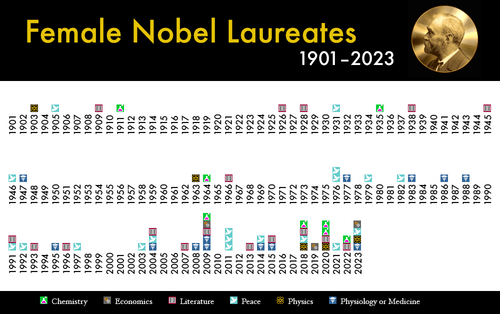
Back قائمة النساء الحاصلات على جائزة نوبل Arabic لستة الستات الحاصلين على جايزة نوبل ARZ Llista de muyeres ganadores del Premiu Nobel AST Nobel mükafatı laureatı qadınların siyahısı Azerbaijani Нобель премияһын алған ҡатын-ҡыҙҙар исемлеге Bashkir Спіс жанчын-лаўрэатаў Нобелеўскай прэміі Byelorussian নোবেল পুরস্কার বিজয়ী নারীদের তালিকা Bengali/Bangla Spisak žena dobitnica Nobelovih nagrada BS Llista de dones guardonades amb el Nobel Catalan پێڕستی ژنانی براوەی خەڵاتی نۆبێل CKB

| Part of a series on |
| Women in society |
|---|
 |
The Nobel Prizes are five separate prizes that, according to Alfred Nobel's will of 1895, are awarded to "those who, during the preceding year, have conferred the greatest benefit to Mankind." Additionally, the Sveriges Riksbank Prize in Economic Sciences in Memory of Alfred Nobel was established by Sveriges Riksbank in 1968 and awarded to a "person or persons in the field of economic sciences who have produced work of outstanding importance."
As of 2023, 65 Nobel Prizes and the Memorial Prize in Economic Sciences have been awarded to 64 women.[1][3] Unique Nobel Prize laureates include 894 men, 64 women, and 27 organizations.[4]
The distribution of Nobel prizes awarded to women is as follows:
- nineteen women have won the Nobel Peace Prize (16.3% of 110 awarded);[5]
- eighteen have won the Nobel Prize in Literature (15% of 120 awarded);[6]
- thirteen have won the Nobel Prize in Physiology or Medicine (5.6% of 230 awarded);[7]
- eight have won the Nobel Prize in Chemistry (4.1% of 191 awarded);[8]
- five have won the Nobel Prize in Physics (1.8% of 224 awarded);[9]
- and three (Elinor Ostrom, Esther Duflo and Claudia Goldin) have won the Nobel Memorial Prize in Economic Sciences (2.17% of 92 awarded).[10]
The first woman to win a Nobel Prize was Marie Curie, who won the Nobel Prize in Physics in 1903 with her husband, Pierre Curie, and Henri Becquerel.[11][12] Curie is also the first person and the only woman to have won multiple Nobel Prizes; in 1911, she won the Nobel Prize in Chemistry. Curie's daughter, Irène Joliot-Curie, won the Nobel Prize in Chemistry in 1935, making the two the only mother–daughter pair to have won Nobel Prizes[11] and of Pierre and Irène Curie the only father-daughter pair to have won Nobel Prizes by the same occasion, whilst there are 6 father-son pairs who have won Nobel Prizes by comparison.[13]
The most Nobel Prizes awarded to women in a single year was in 2009, when five women became laureates in four categories.
The most recent women to be awarded a Nobel Prize were Han Kang in Literature (2024), Claudia Goldin in Economics, Narges Mohammadi for Peace, Anne L'Huillier in Physics and Katalin Karikó in Physiology or Medicine (2023), Annie Ernaux in Literature and Carolyn R. Bertozzi for Chemistry (2022), Maria Ressa for Peace (2021), Louise Glück in Literature, Andrea M. Ghez in Physics, Emmanuelle Charpentier and Jennifer A. Doudna in Chemistry (2020).
- ^ Vereckey, Betsy (March 15, 2022). "The 58 women who have won the Nobel Prize". The Telegraph. Retrieved 22 May 2022.
- ^ "100 Years Ago: Marie Skłodowska-Curie Wins 2nd Nobel Prize". Scientific American. October 28, 2011. Archived from the original on 7 May 2021. Retrieved 30 November 2021.
- ^ Marie Skłodowska-Curie won the Nobel Prize twice, once in Physics and once in Chemistry[2]
- ^ "Nobel Prize facts". NobelPrize.org. Retrieved 2018-10-17.
- ^ "All Nobel Peace Prizes". NobelPrize.org. Retrieved 2020-10-01.
- ^ "All Nobel Prizes in Literature". NobelPrize.org. Retrieved 2020-10-01.
- ^ "All Nobel Prizes in Physiology or Medicine". NobelPrize.org. Retrieved 2023-10-02.
- ^ "All Nobel Prizes in Chemistry". NobelPrize.org. Retrieved 2020-10-07.
- ^ "All Nobel Prizes in Physics". NobelPrize.org. Retrieved 2020-10-06.
- ^ "All Prizes in Economic Sciences". NobelPrize.org. Retrieved 2020-10-01.
- ^ a b "Nobel Laureates Facts - Women". Nobel Foundation. Retrieved 2017-10-07.
- ^ "Nobel Prize in Physics 1903". Nobel Foundation. Retrieved 2008-10-16.
- ^ Chatterjee, Debjani. "Global Day Of Parents 2021: Parent-Child Pairs Who Won The Nobel Prize". NDTV. Retrieved 2021-06-01.